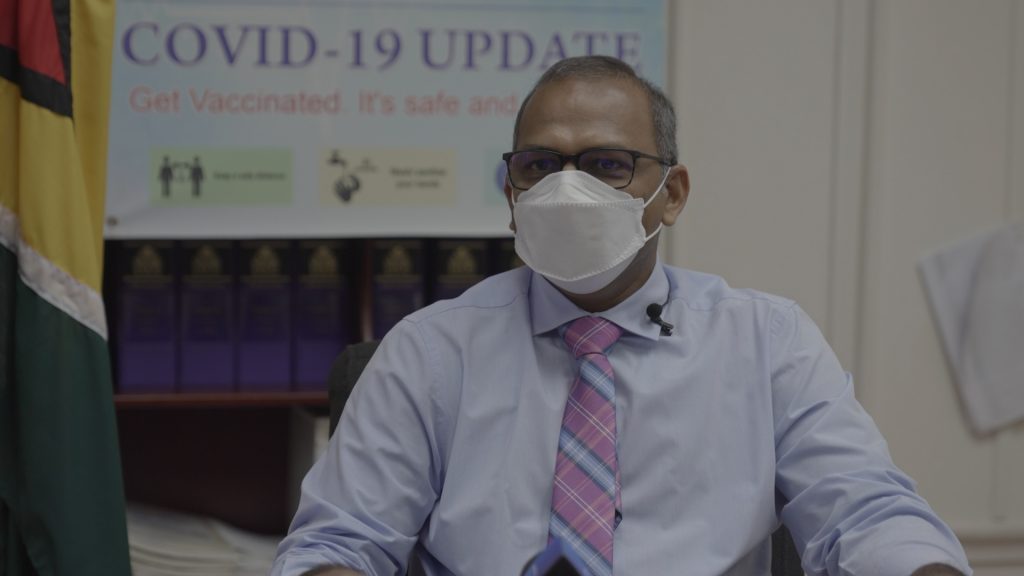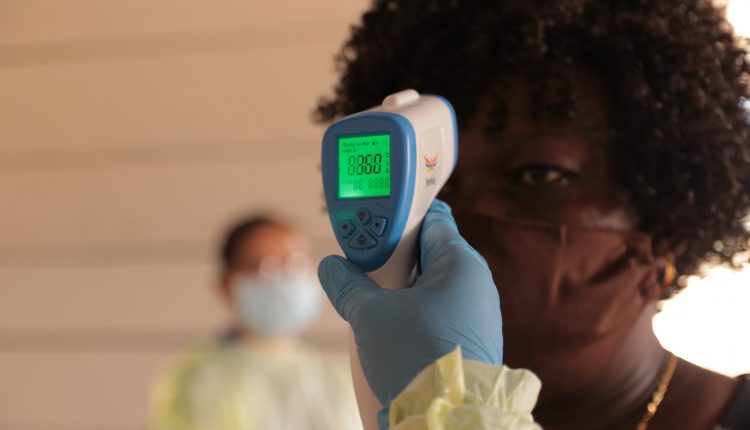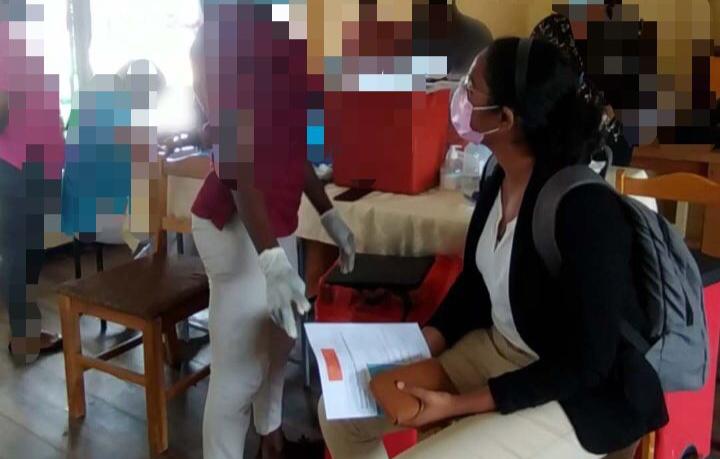
Challenging a paper-based system: Misplaced vaccine cards & revaccination
By Vishani Ragobeer
Mohammed (not real name) is a 27-year-old porter who lives in a community on the East Bank of Demerara (EBD) in Region Four (Demerara- Mahaica). About six weeks ago, he misplaced his COVID-19 vaccination card and the paper-based system of record-keeping has made it difficult for him to get a replacement.
Because he fears that speaking out might result in further delays in getting his card replaced, Mohammed’s personal information has been excluded from this article. The News Room has confirmed that he has engaged the officials and personnel at the Ministry of Health on several occasions.
When he first realised that he misplaced his card, he returned to the vaccination site on the EBD where he received his COVID-19 vaccine. For context, before receiving a COVID-19 vaccine, health workers or volunteers write the individual’s personal information in a long sheet and on individual forms.

According to information provided to the News Room, those sheets are stored in a central bond in Kingston. So, the health workers and volunteers at the vaccination site did not have the handwritten records to verify whether Mohammed had been vaccinated. As such, he was told to make contact with the Health Ministry.
On September 29, after making several attempts to call the ministry and get a replacement, he opted to visit the ministry’s Brickdam head office. There, he engaged some of the healthcare workers and officials administering the COVID-19 vaccines. And, he was told that he should visit the ministry’s bond in Kingston.
He visited the bond later that day, but to no avail. Subsequently, his information was forwarded to an official at the ministry; that official told the News Room that the matter would be addressed.
By Wednesday, October 5, however, Mohammed still could not receive a replacement card or even any sort of verification that he was indeed vaccinated. On that day, Mohammed told the News Room: “I called yesterday at Kingston and some guy took my information and said wait one month.
“He said there’s no information there for me concerning my card.”

On October 1, the News Room asked Health Minister Dr. Frank Anthony about the process of getting a new vaccination card, if one was misplaced or stolen
His response was: “… you will have to apply to the ministry to get one and it will take some time because you will have to go through the books to ensure that you are vaccinated in the first place.”
The Health Minister acknowledged that this system is not necessarily the most effective one and that efforts are being made to secure database software from India.
Co-WIN, a medical database software, has been helping India track the rollout of its massive vaccination programme; the Government of India has offered this software to Guyana. That acquisition has not yet occurred and as such, Guyana is still relying on its solely paper-based system.
For Mohammed, that means that he has to wait indefinitely before he can get another card issued to him. He takes comfort in knowing that he is protected against experiencing the more serious and life-threatening forms of the disease, COVID-19, but it is not only the health impact he has to consider.

Mohammed’s case is not an isolated one; it is the plight of the many people who have misplaced their vaccination cards.
So, what then?
“I was thinking about taking another first dose. What you think?” Mohammed asked a journalist at the News Room.
REVACCINATION
Mohammed is already vaccinated with the Russian-made Sputnik V vaccine. This vaccine, unlike the other two-dose vaccines used for adults locally (the AstraZeneca, Sinopharm and Pfizer), has a first dose that is different from the second.
Without his card, he is also unable to get his second dose, thereby having the increased protection against COVID-19. And, instead of waiting on staffers from the ministry of health to comb through the mountains of paperwork to find the single sheet of paper that he was registered on, he believes that it will be easier to just get vaccinated- all over again.
There are health concerns associated with getting vaccinated again, however. These concerns are worse for people who are already fully vaccinated but opt to get fully vaccinated, again, with another set of vaccines.
Dr. Jacquelyn Jhingree, a Guyanese scientist living in Canada explained that this process of becoming fully vaccinated with another vaccine, even though you are already vaccinated with one set of vaccines, is known as revaccination.
And, during an interview with the News Room, she stressed: “You can’t just go and take a new vaccine.”

The News Room was reliably informed that one man (he will be called ‘John’ to protect his identity) who was already fully vaccinated with the Russian-made Sputnik V vaccine, went to get another set of COVID-19 vaccines. He did this so that he could get another vaccination card that would enable him to freely travel to a country that has not yet recognised the Sputnik V vaccine because of its approval status.
The scientist, however, explained that adequate studies have not been done to assess whether this is safe. Without these studies, the risk of potential adverse events remains unknown.
Similarly, when questioned by the News Room at a recent briefing, PAHO Assistant Director Dr. Jarbas Barbosa firmly stated: “We do not recommend taking a second vaccine.
“There is no medical need for the health of people to take other vaccines; there are no studies guaranteeing that this is a safe procedure (and) so we do not recommend (getting) vaccinated twice.”
Mohammed has not yet gone to get revaccinated since he has been apprised of the potential risks that may be associated with doing so. But that does not mean that others have been dissuaded.
John, for example, has been fully vaccinated and has been able to travel to the country that has not yet recognised the Sputnik V vaccine. With emerging international travel guidelines from the United States (US), for example, will only accept international visitors immunised with COVID-19 vaccines authorized by US regulators or the World Health Organization (WHO).

And, the News Room has been informed that more people, much like John, are trying to get revaccinated- though this is not sanctioned.
As aforementioned, this is not a safe practice because not enough trials have been conducted to ascertain the safety of getting revaccinated or even the medical benefits or harm associated with doing so.
Some questions emerge: How did John do it? Did he have help? Or was this a challenge of having a paper-based system?
A News Room journalist went undercover to see whether it was possible to get another vaccine- and as such, another vaccination card- despite being fully vaccinated already.
JOURNALIST VERSUS THE SYSTEM
On October 6, a vaccination site in Georgetown was visited by this journalist. There, schoolchildren were receiving their Pfizer vaccines in one section and adults in another. At the site, the fully vaccinated journalist approached the volunteer at the registration desk.
She said that only the first dose of the Chinese made Sinopharm was available at the site. The journalist agreed to accept this vaccine and the registration process began.
The woman sat, chatting with her colleague, while she filled up the registration form. She went through the checklist, asking the necessary questions about symptoms, medical conditions, previous vaccines taken and other treatment received.
When asked if any other vaccines had been taken before, the journalist lied and said no. The journalist, however, actually became fully vaccinated with the Sputnik V vaccine in early May and there is paperwork kept somewhere in the Kingston bond to verify that.

It is important to note that the journalist gave the same information- that is the name, national identification (ID) number, cell phone number and date of birth- that was given before when the journalist went for their initial vaccination, and that is recorded on the vaccination card the journalist already possesses.
Because it is a paper-based system and not a digital database, it did not matter. When asked if the “blue book” was needed for the second dose, the response was: “You gotta get this book, you can’t go without the book.”
The volunteer engaging in the registration was further pressed: “Is there any system of pulling up my information?” The response was negative.
After successfully registering, the journalist was escorted to the designated area for vaccination. The journalist was put to sit and prepped for the vaccine. Knowing the potential risks and that the aim of going undercover was not to get vaccinated but to test the system, the journalist declined the vaccine.
The nurse who was about to administer the vaccine collected the newly prepared vaccination card and let the journalist go. Had the journalist not opted out of the vaccination, however, the journalist would receive that first dose of the Sinopharm vaccine and be well-positioned to get the second dose, due to the possession of the second vaccine card. Just like John.

“I think it is more important to get greater vaccine coverage globally as opposed to giving people an extra set of an entire new series of vaccines when they have already been vaccinated,” Dr. Jhingree said.
Similarly, Dr. Anthony has advised against revaccination and instead, appealed to people’s morality.
“… what is wrong about that is that you will end up using two sets of vaccines on one person when there is a global shortage.
“Something is fundamentally wrong with that at this point in time,” Dr. Anthony stated.
The paper-based system, evidently, has its challenges. It is unclear whether communicating the risks of revaccination or simple moral suasion are enough to dissuade people from exploiting the system.
Meanwhile, a frustrated Mohammed laments, “Constantly I have been asked to get the vaccine book… The people keep taking relevant information, but nothing so far.”





